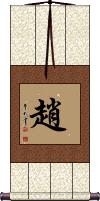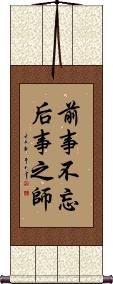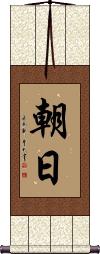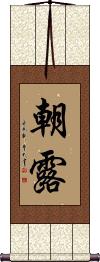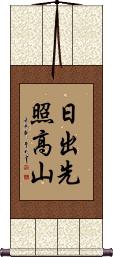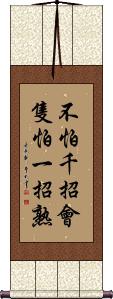Many custom options...
And formats...

Zhao in Chinese / Japanese...
Buy a Zhao calligraphy wall scroll here!
Personalize your custom “Zhao” project by clicking the button next to your favorite “Zhao” title below...
1. Zhao
2. Past experience is the teacher for the future
4. Tiger Rumor
6. Morning Dew
7. Seeker
9. Sun Goddess
10. When the sun rises it first shines on the highest mountain
Zhao
In Chinese, this is Zhao, one of the seven states during the Warring States Period (476-220 B.C.). 趙 is a different period than the Former Zhao 前趙 (304-329 A.D.) and Later Zhao 後趙 (319-350 A.D.) of the Sixteen Kingdoms.
趙 is also a surname in Chinese.
In Japanese, this can be the surname Hiyon or Chou (there are a few other possible pronunciations and names in Japanese).
Past experience is the teacher for the future
Past events not forgotten serve as teachers for later events.
The most literal translation to English of this ancient 前事不忘后事之师 Chinese proverb is:
“Past events not forgotten serve as teachers for later events.”
However, it's been translated several ways:
Don't forget past events, they can guide you in the future.
Benefit from past experience.
Past experience, if not forgotten, is a guide for the future.
Past calamity is my teacher.
A good memory for the past is a teacher for the future.
The remembrance of the past is the teacher of the future.
If one remembers the lessons of the past; They will serve as a guide to avoid mistakes in the future.
The origin:
This proverb comes from the 5th century B.C., just before the Warring States Period in the territory now known as China.
The head of the State of Jin, Zhi Bo, seized power in a coup. He did this with help from the armies of the State of Han and Wei. Instead of being grateful for the help from Han and Wei, he treacherously took the land of Han and Wei. Never satisfied, Zhi Bo employed the armies of Han and Wei to attack and seize the State of Zhao.
The king of Zhao took advice from his minister Zhang Mengtan and secretly contacted the Han and Wei armies to reverse their plans and attack the army of Zhi Bo instead. The plan was successful, and the State of Zhao was not only saved but was set to become a powerful kingdom in the region.
Zhang Mengtan immediately submitted his resignation to a confused king of Zhao. When asked why, Zhang Mengtan said, “I've done my duty to save my kingdom, but looking back at past experience, I know sovereign kings are never satisfied with the power or land at hand. They will join others and fight for more power and more land. I must learn from past experiences, as those experiences are the teachers of future events.”
The king could not dispute the logic in that statement and accepted Zhang Mengtan's resignation.
For generations, the State of Zhao continued to fight for power and land until finally defeated and decimated by the State of Qin (which led to the birth of the Qin Dynasty in 221 B.C.).
Asahi / Morning Sun
朝日 is a version of the Japanese name Asahi.
This can also be Ahisa, Asuka, Ashita, or Asaka. This means morning sun and is the name of the famous beer company in Japan.
This would be read as “Zhao Ri” in Mandarin where it means morning sun but is also known to be the Asahi company (maker of beer and other beverages).
Tiger Rumor
These four characters together relay the meaning that can be expressed in English as “When three people say there's a tiger running in the street, you believe it.”
Of course, there is an ancient story behind this idiom...
三人成虎 is actually a proverb that resulted from a conversation that occurred around 300 B.C.
The conversation was between the king of the Wei kingdom and one of the king's ministers named Pang Cong.
It was near the end of one of many wars, this time with the Zhao kingdom. Pang Cong was to be sent by the king to the Zhao kingdom with the king's son, who was to be held hostage. It was common at the time for a king to make his son a hostage to secure stable peace between warring kingdoms.
Before minister Pang Cong departed, he asked his king, “If one person told you a tiger was running in the street, would you believe it?.”
“No,” the king said.
The minister continued, “What if two people told you?”
The king replied, “Well, I would have my doubts but I might believe it.”
The minister continued, “So, what if three people told you that a tiger is running in the streets?”
The king replied, “Yes, I would believe it. It must be true if three people say it.”
The minister then reminded the king, “Your son and I are now traveling far away to live in the distant Zhao kingdom - much farther from your palace than the street. Rumors may fly about me in my absence, so I hope your majesty will weight such rumors appropriately.”
The king replied, “I have every trust in you, do not worry”
While the minister was gone, the king's enemies gossiped about minister Pang Cong on many occasions. At first, the king thought nothing of these comments and rumors. But slowly, as the rumors mounted, the king began to suspect ill of his minister.
Sometime later, when peace was well-established, the minister and prince were freed and returned to the kingdom of Wei. The king received his son BUT DID NOT EVEN SUMMON MINISTER PANG CONG TO THE PALACE!
Hopefully, this story will help you see how dangerous words can be when used to promote rumors or create ill will. And perhaps will inspire you not to believe everything you hear.
There is also a secondary suggestion in this idiom that gossip is as ferocious as a tiger. Some Chinese people who don't know the ancient story above may believe that this scroll means that rumors are as vicious as three tigers.
Note: This proverb appears in my Korean dictionary but is not well-known in Korea.
Better Late Than Never
It's Never Too Late Too Mend
Long ago in what is now China, there were many kingdoms throughout the land. This time period is known as “The Warring States Period” by historians because these kingdoms often did not get along with each other.
Sometime around 279 B.C. the Kingdom of Chu was a large but not particularly powerful kingdom. Part of the reason it lacked power was the fact that the King was surrounded by “yes men” who told him only what he wanted to hear. Many of the King's court officials were corrupt and incompetent which did not help the situation.
The King was not blameless himself, as he started spending much of his time being entertained by his many concubines.
One of the King's ministers, Zhuang Xin, saw problems on the horizon for the Kingdom, and warned the King, “Your Majesty, you are surrounded by people who tell you what you want to hear. They tell you things to make you happy and cause you to ignore important state affairs. If this is allowed to continue, the Kingdom of Chu will surely perish, and fall into ruins.”
This enraged the King who scolded Zhuang Xin for insulting the country and accused him of trying to create resentment among the people. Zhuang Xin explained, “I dare not curse the Kingdom of Chu but I feel that we face great danger in the future because of the current situation.” The King was simply not impressed with Zhuang Xin's words.
Seeing the King's displeasure with him and the King's fondness for his court of corrupt officials, Zhuang Xin asked permission from the King that he may take leave of the Kingdom of Chu, and travel to the State of Zhao to live. The King agreed, and Zhuang Xin left the Kingdom of Chu, perhaps forever.
Five months later, troops from the neighboring Kingdom of Qin invaded Chu, taking a huge tract of land. The King of Chu went into exile, and it appeared that soon, the Kingdom of Chu would no longer exist.
The King of Chu remembered the words of Zhuang Xin and sent some of his men to find him. Immediately, Zhuang Xin returned to meet the King. The first question asked by the King was “What can I do now?”
Zhuang Xin told the King this story:
A shepherd woke one morning to find a sheep missing. Looking at the pen saw a hole in the fence where a wolf had come through to steal one of his sheep. His friends told him that he had best fix the hole at once. But the Shepherd thought since the sheep is already gone, there is no use fixing the hole.
The next morning, another sheep was missing. And the Shepherd realized that he must mend the fence at once. Zhuang Xin then went on to make suggestions about what could be done to reclaim the land lost to the Kingdom of Qin, and reclaim the former glory and integrity of the Kingdom of Chu.
The Chinese idiom shown above came from this reply from Zhuang Xin to the King of Chu almost 2,300 years ago.
It translates roughly into English as...
“Even if you have lost some sheep, it's never too late to mend the fence.”
This proverb, 亡羊补牢犹未为晚, is often used in modern China when suggesting in a hopeful way that someone change their ways, or fix something in their life. It might be used to suggest fixing a marriage, quitting smoking, or getting back on track after taking an unfortunate path in life among other things one might fix in their life.
I suppose in the same way that we might say, “Today is the first day of the rest of your life” in our western cultures to suggest that you can always start anew.
Note: This does have Korean pronunciation but is not a well-known proverb in Korean (only Koreans familiar with ancient Chinese history would know it). Best if your audience is Chinese.
Morning Dew
Seeker
Life is a Dew Drop
人生朝露 is a proverb that means “human life is like morning dew.”
Figuratively, this suggests the ephemeral and precarious nature of human existence.
Also translated as:
Man's life vanishes like a drop of dew.
A person's life is as fleeting as morning dew.
Life is as transient as morning due.
Sun Goddess
天照皇大神 is the title for Sun Goddess or Amaterasu Oomikami in Japanese.
Rare Chinese Buddhists/Shitoists may be familiar with this (so I have included the Chinese pronunciation above) however, this should generally be considered a specifically-Japanese title.
Besides Amaterasuoomikami, this can also be pronounced/romanized as Tenshoukoudaijin. There are several similar ways to write Sun Goddess in Japanese, so don't be surprised if you see different forms on the web, etc.
When the sun rises it first shines on the highest mountain
This old Buddhist phrase means, “When the sun rises it always shines first on the highest mountain,” or “When the sun appears, it first casts its light upon the highest mountain.”
This comes from the Avatamsaka Sutra and has been used as the name or portion of the name for temples in Japan and sites in China.
The Buddha's first round of teaching (Avatamsaka period) is likened to the time when the sun rises from the east horizon. When the sun first rises it illuminates the high mountains. In this analogy, the high mountains represent the great Bodhisattvas and/or those most ready to receive enlightenment and liberation.
This can be romanized from Japanese as “Nichi shutsu sen shō kō san,” “Nisshutsu saki teru takayama,” or “Hide temazu kōzan wo terasu yama.” The last one is probably the most common. Ask three Japanese people what they think the pronunciation is, and you will get three different opinions.
1000 good moves ruined by 1 bad
不怕千招会只怕一招熟 is a Chinese proverb that literally translates as: Do not worry about making a thousand clever moves; what [one has to] fear is one bad move.
Figuratively, this means: Even if you have made many clever moves before, one wrong move will ruin the whole game.
I compare this to the English saying, “It takes only one Aw-shit to wipe out a thousand Attaboys.”
Wisdom from Hard Knocks
The school of hard knocks
挨一拳得一招挨十拳變諸葛 is a Chinese proverb that literally translates as: Receive one blow, [and one] learns a lesson; Receive ten blows, [and one] becomes a great Zhuge [Liang].
You must first understand that a man named Zhuge Liang was one of the great strategists and philosophers in Chinese history. He's known as a man of great wisdom.
Figuratively, this phrase means:
One can learn much from failure or “hard knocks.”
Not the results for Zhao that you were looking for?
Below are some entries from our dictionary that may match your Zhao search...
| Characters If shown, 2nd row is Simp. Chinese |
Pronunciation Romanization |
Simple Dictionary Definition |
趙 赵 see styles |
zhào zhao4 chao hiyon ひよん |
More info & calligraphy: Zhao(surname) Hiyon To hasten to, return; a long time. |
朝日 see styles |
zhāo rì zhao1 ri4 chao jih noboru のぼる |
More info & calligraphy: Asahi / Morning Sunmorning sun; (male given name) Noboru |
朝露 see styles |
zhāo lù zhao1 lu4 chao lu asatsuyu; chouro / asatsuyu; choro あさつゆ; ちょうろ |
More info & calligraphy: Morning Dewmorning dew Morning dew, e.g. man's life as transient. |
兆 see styles |
zhào zhao4 chao toki とき |
(bound form) omen; to foretell; million; mega-; (Tw) trillion; tera-; (old) billion (numeric) (1) 10^12; 1,000,000,000,000; trillion; (2) sign; omen; indication; portent; (personal name) Toki An omen; a million. |
召 see styles |
zhào zhao4 chao jō |
to call together; to summon; to convene; temple or monastery (used in place names in Inner Mongolia) To summon, call. |
啅 see styles |
zhào zhao4 chao |
chirp |
嘲 see styles |
zhāo zhao1 chao |
used in 嘲哳[zhao1zha1] |
垗 see styles |
zhào zhao4 chao |
sacrifice |
找 see styles |
zhǎo zhao3 chao |
to try to find; to look for; to call on sb; to find; to seek; to return; to give change |
招 see styles |
zhāo zhao1 chao maneki まねき |
to recruit; to provoke; to beckon; to incur; to infect; contagious; a move (chess); a maneuver; device; trick; to confess (surname) Maneki Call, beckon, notify, cause; confess. |
旐 see styles |
zhào zhao4 chao |
banner |
昭 see styles |
zhāo zhao1 chao masaharu まさはる |
bright; clear; manifest; to show clearly (prefix) (abbreviation) (See 昭和・1) nth year in the Shōwa era (1926.12.25-1989.1.7); (personal name) Masaharu Bright, illustrious. |
㍼ see styles |
zhāo hé zhao1 he2 chao ho terukazu てるかず |
Shōwa, Japanese era name, corresponding to the reign (1925-1989) of emperor Hirohito 裕仁[Yu4 ren2] (1) (hist) Shōwa era (1926.12.25-1989.1.7); (adjectival noun) (2) (colloquialism) reminiscent of the Shōwa era; Shōwa-nostalgic; old-fashioned; quaint; old-school; (given name) Terukazu |
曌 see styles |
zhào zhao4 chao |
name invented for herself by Tang empress Wu Zetian 武則天|武则天[Wu3 Ze2 tian1] |
朝 see styles |
zhāo zhao1 chao hajime はじめ |
morning (n,n-suf) (1) dynasty; (n,n-suf) (2) reign; (n,n-suf) (3) period; epoch; age; (n,n-suf) (4) court; (5) (abbreviation) (See 北朝鮮) North Korea; (personal name) Hajime Morning. Court, dynasty; towards. |
櫂 棹 see styles |
zhào zhao4 chao kai かい |
oar (archaic); scull; paddle; to row; a boat paddle; oar; scull; (female given name) Kai |
沼 see styles |
zhǎo zhao3 chao masanori まさのり |
pond; pool (1) marsh; swamp; wetland; bog; pond; (n,n-suf) (2) (slang) obsession; addiction; being hooked on; getting sucked into; (3) (net-sl) ugly man; (4) (net-sl) (derogatory term) (See 池沼・2) retard; mentally disabled person; (personal name) Masanori |
炤 照 see styles |
zhào zhao4 chao |
variant of 照[zhao4]; to shine; to illuminate See: 照 |
照 see styles |
zhào zhao4 chao hikaru ひかる |
according to; in accordance with; to shine; to illuminate; to reflect; to look at (one's reflection); to take (a photo); photo; as requested; as before (given name) Hikaru To shine, illumine; to superintend; a dispatch, pass; as, according to. |
爫 see styles |
zhǎo zhao3 chao |
"claw" radical in Chinese characters (Kangxi radical 87) |
皽 see styles |
zhāo zhao1 chao |
(literary) dead skin cells on the surface of the skin; Taiwan pr. [zhan3] |
笊 see styles |
zhào zhao4 chao zaru ざる |
loosely woven bamboo ladle (1) (kana only) draining basket (traditionally made of bamboo); colander; strainer; sieve; (2) (kana only) (See ざる法,ざる碁) something full of holes; (3) (abbreviation) (kana only) {food} (See ざる蕎麦) zaru soba; (4) (colloquialism) (kana only) strong drinker; someone who can drink like a fish; (surname) Zaru |
罩 see styles |
zhào zhao4 chao |
to cover; to spread over; a cover; a shade; a hood; bamboo fish trap; bamboo chicken coop; (Tw) (coll.) to protect; to have sb's back; (Tw) (coll.) awesome; incredible; (Tw) (coll.) (often as 罩得住[zhao4de2zhu4]) to have things under control; to be able to handle it |
肇 see styles |
zhào zhao4 chao hajime はじめ |
at first; devise; originate (given name) Hajime To begin, initiate. |
肈 肇 see styles |
zhào zhao4 chao |
the start; the origin See: 肇 |
詔 诏 see styles |
zhào zhao4 chao norikatsu のりかつ |
(literary) to admonish; (bound form) imperial edict (personal name) Norikatsu a decree |
釗 钊 see styles |
zhāo zhao1 chao |
to encourage; to cut; to strain |
鉊 𬬿 see styles |
zhāo zhao1 chao |
sickle |
駋 see styles |
zhāo zhao1 chao |
(horse) |
鮡 𬶐 see styles |
zhào zhao4 chao |
fish of family Sisoridae (Asiatic catfishes) |
Click here for more Zhao results from our dictionary
The following table may be helpful for those studying Chinese or Japanese...
| Title | Characters | Romaji (Romanized Japanese) | Various forms of Romanized Chinese | |
| Zhao | 趙 赵 | chou / cho | zhào / zhao4 / zhao | chao |
| Past experience is the teacher for the future | 前事不忘后事之師 前事不忘后事之师 | qián shì bú wàng hòu shí zhī shī qian2 shi4 bu2 wang4 hou4 shi2 zhi1 shi1 qian shi bu wang hou shi zhi shi | ch`ien shih pu wang hou shih chih shih chien shih pu wang hou shih chih shih |
|
| Asahi Morning Sun | 朝日 | asahi | zhāo rì zhao1 ri4 zhao ri zhaori | chao |
| Tiger Rumor | 三人成虎 | sān rén chéng hǔ san1 ren2 cheng2 hu3 san ren cheng hu sanrenchenghu | san jen ch`eng hu sanjenchenghu san jen cheng hu |
|
| Better Late Than Never | 亡羊補牢猶未為晚 亡羊补牢犹未为晚 | wáng yáng bǔ láo yóu wèi wéi wǎn wang2 yang2 bu3 lao2 you2 wei4 wei2 wan3 wang yang bu lao you wei wei wan | wang yang pu lao yu wei wei wan wangyangpulaoyuweiweiwan |
|
| Morning Dew | 朝露 | asatsuyu | zhāo lù / zhao1 lu4 / zhao lu / zhaolu | chao lu / chaolu |
| Seeker | 找尋著 找寻着 | zhǎo xún zhě zhao3 xun2 zhe3 zhao xun zhe zhaoxunzhe | chao hsün che chaohsünche |
|
| Life is a Dew Drop | 人生朝露 | jin sei chou ro jinseichouro jin sei cho ro | rén shēng zhāo lù ren2 sheng1 zhao1 lu4 ren sheng zhao lu renshengzhaolu | jen sheng chao lu jenshengchaolu |
| Sun Goddess | 天照皇大神 | amaterasuoomikami amaterasuomikami | tiān zhào huáng dà shén tian1 zhao4 huang2 da4 shen2 tian zhao huang da shen tianzhaohuangdashen | t`ien chao huang ta shen tienchaohuangtashen tien chao huang ta shen |
| When the sun rises it first shines on the highest mountain | 日出先照高山 | hiide temazu kousan wo terasu yama hide temazu kosan wo terasu yama | rì chū xiān zhào gāo shān ri4 chu1 xian1 zhao4 gao1 shan1 ri chu xian zhao gao shan richuxianzhaogaoshan | jih ch`u hsien chao kao shan jihchuhsienchaokaoshan jih chu hsien chao kao shan |
| 1000 good moves ruined by 1 bad | 不怕千招會隻怕一招熟 不怕千招会只怕一招熟 | bú pà qiān zhāo huì zhǐ pà yī zhāo shú bu2 pa4 qian1 zhao1 hui4 zhi3 pa4 yi1 zhao1 shu2 bu pa qian zhao hui zhi pa yi zhao shu | pu p`a ch`ien chao hui chih p`a i chao shu pu pa chien chao hui chih pa i chao shu |
|
| Wisdom from Hard Knocks | 挨一拳得一招挨十拳變諸葛 挨一拳得一招挨十拳变诸葛 | ái yī quán dé yī zhāo ái shí quán biàn zhū gě ai2 yi1 quan2 de2 yi1 zhao1 ai2 shi2 quan2 bian4 zhu1 ge3 ai yi quan de yi zhao ai shi quan bian zhu ge | ai i ch`üan te i chao ai shih ch`üan pien chu ko ai i chüan te i chao ai shih chüan pien chu ko |
|
| In some entries above you will see that characters have different versions above and below a line. In these cases, the characters above the line are Traditional Chinese, while the ones below are Simplified Chinese. | ||||
Successful Chinese Character and Japanese Kanji calligraphy searches within the last few hours...
